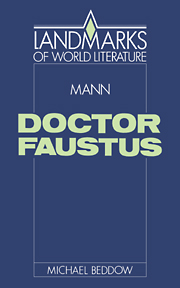3 - Matters theological
Published online by Cambridge University Press: 05 June 2012
Summary
Parody and transcendence
In the last years of his life, Thomas Mann increasingly thought of himself as a ‘religious’ author. Two concepts recur in conjunction with this idea. The first is ‘reverence [Ehrfurcht] towards the mystery that is man’ (IX, 711). The second, frequently encountered in Doctor Faustus, is association of religion with paradox. The two ideas are linked, since Mann views paradox as the site of mystery and consequently as a stimulus to reverence. Where reason encounters things which require the application of contradictory concepts or judgements, there is an inkling of a reality which human categories cannot master, an intimation of transcendence. This outlook is, however, difficult to reconcile with a way of thinking schooled by Nietzsche's militant and programmatic immanence, where mystery is relentlessly unmasked as mystification in the interests of some will to power, and paradox is dissolved into the inevitable differences between distinct perspectives on a constantly changing flux.
All the same, Mann was clearly determined to make his novel a religious work in more than an incidental sense. Any novel on the Faust theme will use concepts drawn from the language of religious belief, but the more those concepts are redefined in terms of an author's own vision, the less they guarantee a religious dimension in the finished work. Thomas Mann, like Goethe before him, engages in substantial and comprehensive secular redefinition of most of the key concepts in the Faust story; but unlike Goethe, he seems unhappy about his own secularism.
- Type
- Chapter
- Information
- Mann: Doctor Faustus , pp. 67 - 80Publisher: Cambridge University PressPrint publication year: 1994

